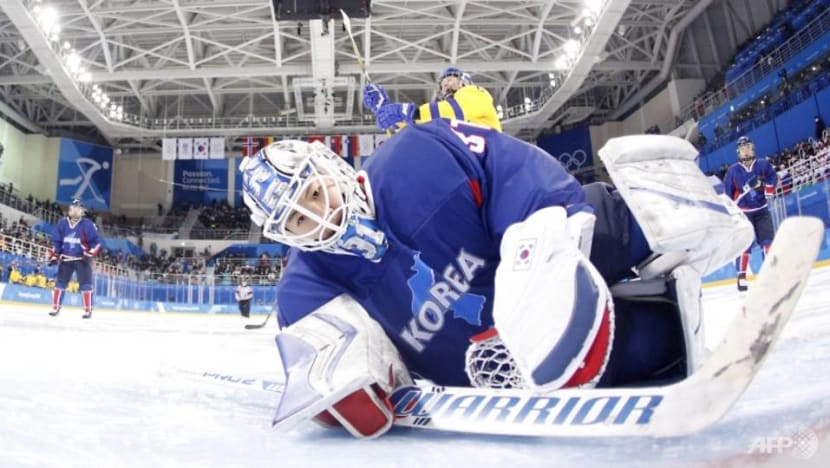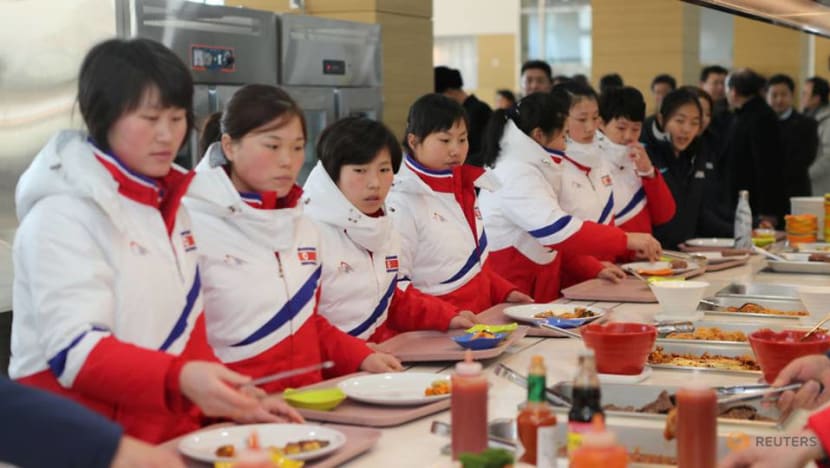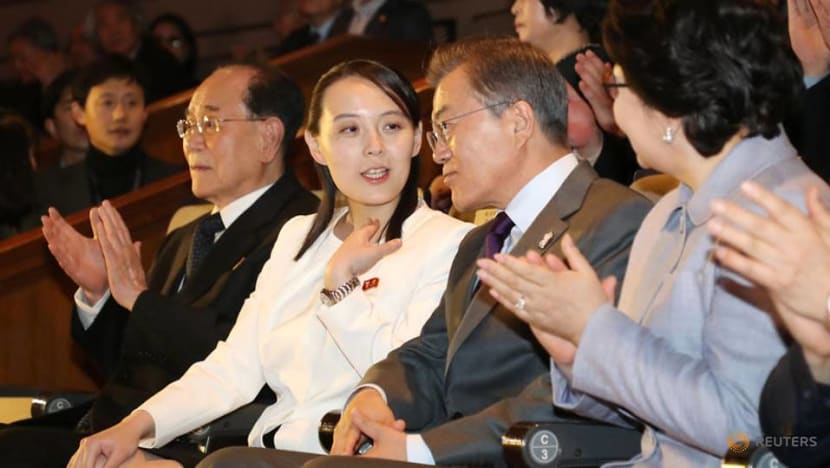commentary Commentary
Commentary: Winter Olympics reveal the embarrassing gap between North and South Korea
Recent developments at the Pyeongchang Olympic Games including the backlash over the Women's ice hockey team has shown how huge the gap is between Seoul and Pyongyang, says one political commentator.

North Korea's band of all-female supporters was unable to inspire the historic joint Korean women's ice hockey team as they were dumped out of the Pyeongchang Olympics with an 8-0 defeat to Sweden. (Photo: AFP/KIM KYUNG-HOON)
SEOUL: Shortly before the start of the ongoing Winter Olympics, South Korea and North Korea reached an unprecedented agreement.
The North would take part in the games, which were to be held in the South Korean county of Pyeongchang.
North Korea would send an official delegation composed of some high-ranking officials, including the leader’s sister, an art troupe and dozens of cheerleaders.
The two sides said the North Korean presence at the Olympics would symbolise their shared identity, and portend an improvement in ties, which for years have been plagued by political and military tensions.
A UNIFIED WOMEN’S ICE HOCKEY TEAM?
The most conspicuous act of cooperation would be a unified women’s hockey team, which would feature players from both Koreas, and compete under a unified flag.
That team has, unwittingly and through no fault of the players or coaches, become an illustration of how despite signs of rapprochement, the two sides are actually farther than ever before from reunifying, or even sustainably cooperating.
Instead of being a truly unified team, the group that participated in the Olympics really was the South Korean team with North Korean players added to it.
Under an agreement with the International Olympic Committee, 12 North Korean players joined the roster, and head coach Sarah Murray, a dual national of Canada and the United States, was obligated to dress a minimum of three North Korean players for each game.
There is no evidence that any of the North Korean players were skilled enough to crack the South Korean rotation based purely on merit. They were probably there because political higher-ups liked the optics of South and North Korean athletes playing on the same team.

Murray was given only ten days to practice with the added players, and while she didn’t openly oppose the plan, she did tell one broadcaster:
The whole situation is kind of mind-blowing.
BACKLASH AGAINST THE IDEA
After publicly announcing the decision to field the unified team, South Korean President Moon Jae-in took a hit to his approval ratings, which was widely interpreted as backlash for the decision.
Many South Koreans, particularly the young, are not wedded to the idea of shared nationhood with North Korea, and saw the unified team not as an illustration of peaceful cooperation, but an act of unfairness.
There were South Korean players who had trained for years and rightfully earned their spots, who would be denied the opportunity to play because North Koreans were added to the team.
And North Koreans were added to the team not because they deserved to be there, but likely because some powerful person decided so.
PROPPING UP PYONGYANG
The women's hockey team isn’t the only indication at these Olympics of how far apart the two sides are.
South Korea is far wealthier than its northern counterpart, and when it's time to cooperate on something, it is Seoul that gets asked to foot the bill.
On Wednesday (Feb 14), Seoul approved the allocation of government funds to cover the costs of North Korea’s trip to the Olympics, a total of more than US$2.5 million.
South Koreans who aren’t in favor of reunification - a large and growing segment of society - would point to this arrangement as evidence that cooperation between the two Koreas isn’t an even-handed partnership among equals, but one side propping up the other at its own expense.
The last time unification seemed like a plausible prospect on the Korean Peninsula was during the ten years of the so-called Sunshine Policy, a system of regular engagement between the two sides, under which the South provided unconditional aid.
In the ensuing years, North Korea has stepped up its nuclear programme and a strict set of international sanctions have been enacted in response. South Korea therefore could not restart such a system of aid without breaching the terms of the sanctions, and displeasing its main ally, the United States.

Unlike the North, South Korea is a full-fledged member of the international community, and as such, has responsibilities that clash with its instincts to make nice with its northern brethren.
NO THANKS FOR THE SAMSUNG SMARTPHONES
In another illustration, North Korean athletes were not allowed to accept the Samsung smartphones that the South Korean tech giant gave to all Olympic athletes as a gift.
If there is one object that emblematises South Korea in 2018, it’s a smartphone. That North Koreans probably have never used one is a stark indication of how far apart the two sides are.
And in a sad end to the story of the combined hockey team, the Koreans got clobbered on the ice. They lost all three group-stage games, by a combined score of 20-1.
To be fair, South Korea went into this tournament an underdog, ranked 22nd in the world (their first two opponents, Switzerland and Sweden, are ranked 6th and 5th, respectively). It is likely that they would have struggled even without the distraction of the last-minute addition of the North Koreans.
Yet the enduring memory of the team’s performance will be that, however well-intentioned, to avoid failure, efforts toward reunification should be carefully planned far in advance.
And the reality is that the two sides are now too far apart in terms of economic development to form a cohesive whole, and the South Korean public is frostier than ever about such a prospect.
After the North Korean delegation returned home, the North’s official media said that Pyongyang looks forward to continued cooperation going ahead.
The warm vibes should be welcomed, as they make an outbreak of war on the Korean peninsula less likely, but a formal coming together of the two Koreas is more distant than ever.
Steven Borowiec is the politics editor of Korea Exposé.












